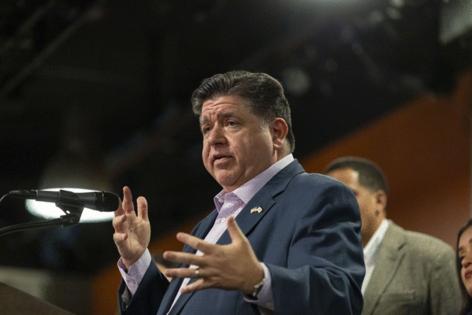Gov. JB Pritzker says Trump is 'losing it' after latest Chicago National Guard threat
Published in News & Features
CHICAGO — President Donald Trump again vowed to deploy the National Guard to Chicago “against” the opposition of Gov. JB Pritzker, prompting the Democratic governor on Tuesday to label the president’s latest comments a possible sign of “dementia” after a month of on-and-off threats by Trump to mobilize the military to the city.
Trump, speaking Tuesday to reporters on the White House lawn as he prepared to depart for a state visit to the United Kingdom, once again recounted a meeting he held with Jim Vena, the CEO of the Union Pacific railroad, who is seeking federal approval to merge with Norfolk Southern. Vena told the president, “‘Sir, you have to save Chicago,’” Trump said.
“So I’m going to go to Chicago early against Pritzker. Pritzker is nothing. If Pritzker was smart, he’d say, ‘Please come in,’” Trump said, before reciting crime statistics and mocking local authorities by saying, “If they lose less than six or seven people a week with murder, they’re doing a great job in their opinion.” Crime rates in Chicago are down from previous years, according to data from the Chicago Police Department.
Citing his federalization of law enforcement and the National Guard in Washington, D.C., and his order Monday to mobilize the Guard and a federal task force to Memphis, Tennessee, backed by Republican Gov. Bill Lee, Trump said, “Chicago is a death trap and I’m going to make it just like I did with D.C., just like I’ll do with Memphis.”
Trump said Vena told him, “‘Chicago is a great city. You can save Chicago, sir. Don’t let Chicago die.’ This is the guy telling me, with great knowledge and stuff, he said, ‘Don’t let Chicago die soon. It’s dying. Don’t let it die.’ I’m going to Chicago next.”
But Pritzker said Trump’s latest comments were a reminder “that you can’t take anything that he says seriously from one day to the next.”
“He’s attacking verbally, sometimes he attacks, sending his agents in, sometimes he forgets. I think he might be suffering from some dementia. The next day, he’ll wake up on the other side of the bed and stop talking about Chicago,” Pritzker, an ardent critic of Trump and a potential 2028 White House aspirant, said of the president.
“So I’ve never really counted on anything that he said as real. When he said that he wasn’t coming to Chicago, I didn’t trust that. When he says he is coming to Chicago, it’s hard to believe anything he says,” Pritzker said. “I think he’s losing it.”
Pritzker said the Trump administration’s “Operation Midwest Blitz” mobilization of immigration enforcement that began a week ago was a pretext for presidential mobilization of the National Guard by sending U.S. Immigration and Customs Enforcement agents on raids to “cause challenges and mayhem on the ground, and you’re seeing that.”
“The harder the ICE agents come in, the more people want to intervene and step in the way of them. And when that happens, and when there’s any kind of, well, touching or engagement with those ICE agents that involves actual potential battery, well, that’ll be the excuse,” Pritzker said. “And it’s wrong, by the way. They are causing it. It is the president. It is (Department of Homeland Security Secretary) Kristi Noem.”
Trump has sought to use the National Guard and immigration enforcement as part of a political effort to portray Republicans as the law-and-order party in advance of next year’s critical midterm congressional elections.
But a presidential mobilization of the National Guard to Chicago, overriding Pritzker’s authority as commander-in-chief of the Illinois Guard as well as state sovereignty, would likely set up a legal battle that the governor has already threatened.
Trump’s vacillation over mobilizing the National Guard in Chicago followed a federal judge’s ruling in San Francisco that said the president’s June deployment of the Guard and Marines to Los Angeles in response to anti-immigration enforcement protests was illegal under the 1878 Posse Comitatus Act, which sharply limits what the U.S. military can do on domestic soil.
While Trump had put Chicago in his sights for weeks as a Guard deployment target, he instead ordered military mobilization to Memphis. The move had been thought to be prompted by legal issues over deploying the Guard to a state over a governor’s opposition.
In Memphis, the state ACLU criticized Trump’s move as “another effort to expand his power and stoke fear,” and called the federal task force sent to the city “regressive policing.”
“This latest step makes clear that the Trump administration is claiming a sweeping mandate to patrol, arrest and detain people in Memphis, and will bring back the same failed policing tactics that caused widespread constitutional violations for decades,” the ACLU said.
But the White House promoted what it called “Trump’s bold action to deploy federal resources to Memphis” and touted supportive comments for it from “residents, business owners, and area lawmakers as a transformative step to reclaim the city from violent crime and chaos.”
_____
©2025 Chicago Tribune. Visit chicagotribune.com. Distributed by Tribune Content Agency, LLC.







Comments